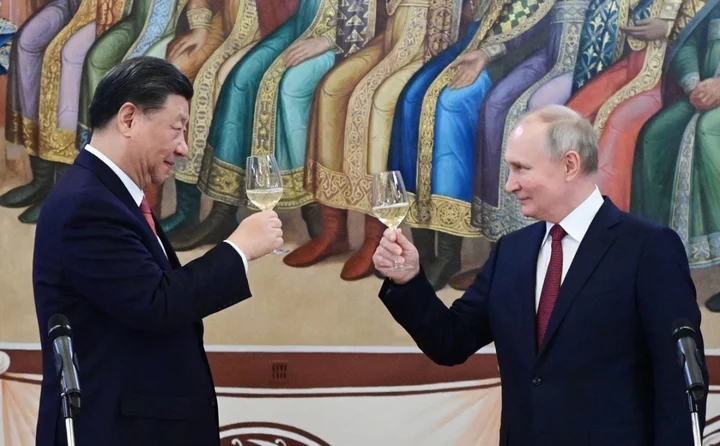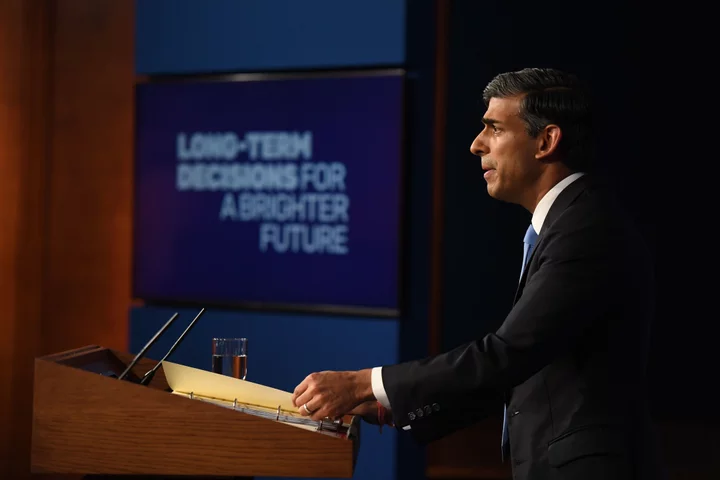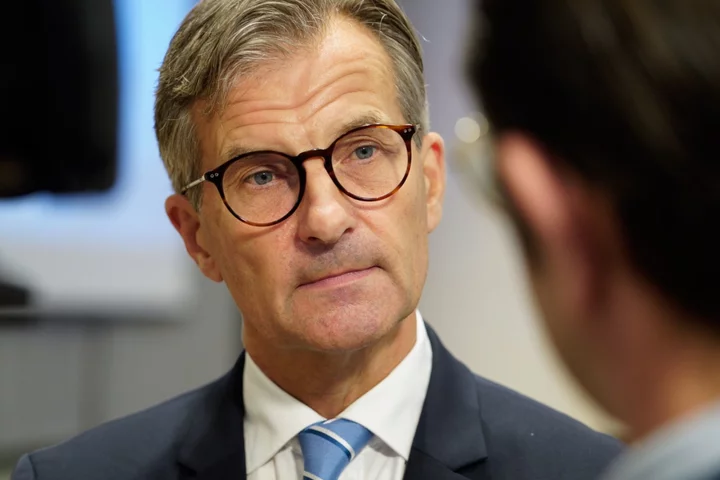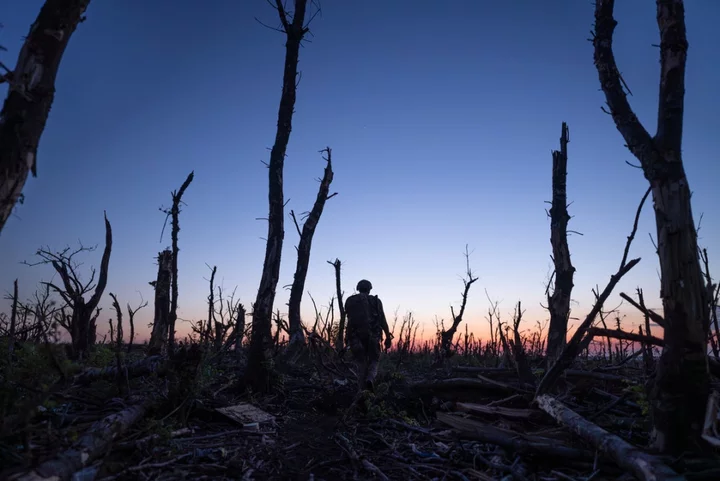
Why are Scots supporting Fiji at the Rugby World Cup?
An Army base in Edinburgh is rooting for an unexpected nation at the French tournament.
1970-01-01 08:00

Diners Making Over $125,000 Are Spending Less at Ruth's Chris and Capital Grille
Darden Restaurants Inc. is seeing more “softness” among households with incomes above $125,000 compared to last year, Chief
1970-01-01 08:00

Comcast’s USA Network Takes Over WWE Rights From Fox Under New Deal
Comcast Corp.’s NBCUniversal has reached a five-year deal to air WWE’s Friday Night SmackDown, taking over broadcast rights
1970-01-01 08:00

Putin trip to meet Xi in China confirmed for next month
Vladimir Putin has accepted an invite from Xi Jinping to visit China for a Belt and Road Summit being held in October in his first known trip abroad since an arrest warrant was slapped against him for the deportation of children from Ukraine. The Russian president recently met North Korean dictator Kim Jong-un and is looking to cement ties with a handful of allies after being isolated on the world stage due to his invasion of Ukraine. Russia and China are “integrating our ideas of creating a large Eurasian space”, Mr Putin said, adding that the Chinese-led Belt and Road initiative is a part of that. He announced his intention to visit Beijing after a meeting with Chinese foreign minister Wang Yi, who is in Moscow this week for a strategic diplomatic visit. Mr Putin told the top Chinese diplomat that the Belt and Road strategy “fully meets and coincides” with Russia’s interests, according to a statement by the Kremlin. He will be attending the summit in Chinese capital Beijing. “We believe in merging our vision of creating a Greater Eurasian space with the idea of our Chinese friends as part of the Belt and Road Initiative, and we have been quite good at synchronising our efforts,” he said. After invading Ukraine in February last year, Mr Putin has increasingly relied on seeking support from his allies in Asia, prominently China and North Korea. Russia has also amped up trade with China by selling it more energy and showing diplomatic bonhomie by carrying out joint military exercises. The talks in Beijing will be thorough, said Nikolai Patrushev, a close aide to the Russian president and the secretary of Russia’s Security Council. He said Russia and China should deepen cooperation in the face of the West’s attempt to contain them both. Both countries also have strained relations with the US, with Mr Xi briefly becoming the only foreign leader to have paid Mr Putin a visit in Moscow until recently, when Mr Kim revelled in his own six-day sojourn to Russia’s far east. A flagship initiative of Beijing, the Belt and Road project has been a key prospect for China to expand its influence in developing countries through infrastructure projects. On the continuing war in Ukraine, China has shown a neutral stand and has gone to the extent of criticising Western sanctions against Moscow and the arming of Kyiv by several Western nations. It also accused Nato and the US of provoking Russia’s military action and declared last year that it had a “no-limits” friendship with Russia. Earlier this year, CIA director William Burns said Russia was becoming more and more dependent on China and was even at risk of becoming its “economic colony” in time. Read More Why Vladimir Putin needs Xi Jinping now more than ever Why Vladimir Putin and Kim Jong-un are desperate for each other’s help Ukraine kills 130 Russian soldiers in single day in southern push Chinese foreign minister visits Russia for ‘security’ talks day after Kim Jong-un leaves country
1970-01-01 08:00

Russia Temporarily Limits Diesel and Gasoline Exports
Russia’s government has temporarily limited exports of diesel and gasoline in a bid to stabilize the domestic fuel
1970-01-01 08:00

Grief author accused of killing husband with fentanyl cocktail claims damning letter is merely a book excerpt
A grief author accused of poisoning her husband with a fentanyl-laced cocktail has claimed a damning letter found in her jail cell is merely an excerpt from her new book. Kouri Richins, 33, is facing charges of aggravated murder and three counts of drug possession with intent to distribute over the March 2022 death of her husband Eric Richins. Ms Richins allegedly killed her husband of seven years and father of her children by slipping a lethal dose of fentanyl into a Moscow Mule he later drank. Before her arrest earlier this year, Ms Richins self-published a children’s book about grief based on her children’s experiences after they lost their father. Last week, the 33-year-old was charged with witness tampering after a letter was found in her cell in which she allegedly asked her brother to “falsely” testify that her husband died after ordering drugs and pills from Mexico. But now, in a phone call to her mother, Ms Richins has claimed the incriminating letter was simply part of a fictional book she is writing about her stay in a Mexican prison, according to court documents. “When I first got in here I was telling you how I was writing a book … those papers were not a letter to you guys, they were part of my freaking book … I was writing this fictional mystery book,” Ms Richins says in the call, according to a court filing. “I go to Mexico and I’m like trying to find these drugs … I’m writing about Dad … like me and Dad went to Mexico to find these drugs … you can very much tell that the whole thing is very much a story … then I get in the Mexican prison … I said have Skye sneak me in some white strips because my teeth are getting yellow because all we do is drink coffee in the Mexican prison.” In the jailhouse letter, Ms Richins told her mother to instruct her brother, Ronald Darden, to testify that her husband got fentanyl from Mexico. “Here is what I’m thinking but you have to talk to Ronney,” Ms Richins wrote in the letter. “A year prior to Eric’s death, Ronny was over watching football and Eric and Ronny were chatting about Mexico trips. Eric told Ronny he gets painkillers [and] fentanyl from Mexico.” Ms Richins went on to write that Mr Darden “would probably have to testify to this but it’s super short not a lot to it”. She also said in the letter Mr Darden could take some liberties with the narrative as long as he got the point across. Prosecutors have previously said there is no evidence suggesting Mr Richins bought the fentanyl that killed him. In a request to the court filed on Tuesday, prosecutors said Ms Richins’ motion about the letter “contains factual errors and legal misunderstandings, rendering it unpersuasive at best”. Prosecutors have claimed that Ms Richins had previously tried to poison her husband after he consulted a divorce attorney on learning that his wife was $2m in debt. Ms Richins had also reportedly taken out at least four life insurance policies on her husband before allegedly poisoning him. Ms Richins has denied all the allegations against her. If convicted, she faces between 25 years to life in prison. Read More Grief author accused of killing husband with fentanyl allegedly asked brother to lie in letter found in cell Mother accused of killing husband with fentanyl-laced cocktail ‘misses her children’ in prison, lawyer says Utah woman who allegedly sold author Kouri Richins fentanyl used to poison husband appears in court
1970-01-01 08:00

UK Will Widen Climate Aid Definition to Meet Target More Cheaply
The UK plans to expand its definition of what counts as climate aid in order to meet its
1970-01-01 08:00

Sergio Brown missing - updates: Ex-NFL player tracked to Mexico after new Instagram video
Authorities in Illinois reportedly believe former NFL player Sergio Brown could be in Mexico, days after his mother was found dead in a creek behind her home. Mystery erupted around Mr Brown on Saturday after a concerned family member filed a missing persons report for the 35-year-old New England Patriots alum and his mother Myrtle Brown, 73. Myrtle was found dead less than 100 yards from her Maywood home the following day. Her death was ruled a homicide as the Cook County Medical Examiner’s Office found injuries resulting from an assault. The case took a bizarre turn as videos emerged from an Instagram account linked to Mr Brown. Authorities had said they were investigating the authenticity of the posts, in which a man identified as Mr Brown claimed he was kidnapped by the FBI and that his mother was on vacation. Maywood police has now determined that one of the videos was recorded in Playa del Carmen, Forbes reports. The Independent has not received confirmation from authorities that Mr Brown is in Mexico. Eagle-eyed social media users previously pointed out that a building’s logo in the background of the video appeared to spell the words “Sabbia Condos.” Read More Missing ex-NFL star posts bizarre Instagram about police and FBI after mother found dead in creek Ex-NFL star Sergio Brown and his mother went missing. Police say she was murdered and he has yet to be found Sergio Brown posts second strange video about Finding Nemo while ‘missing’ after mother’s death
1970-01-01 08:00

Carbon Offsets Undercut California’s Climate Progress, Researchers Find
Since the passage of its landmark climate regulations 17 years ago, California has been a leader in the
1970-01-01 08:00

Riksbank Hikes Swedish Rate With Door Kept Open to Act Again
Sweden’s Riksbank raised borrowing costs by a quarter point and signaled an intensified response to stubborn inflation that
1970-01-01 08:00

Traders on Intervention Watch as Yen Hovers Near 150 to Dollar
Traders are on guard for any sharp move in the yen as it hovers near the 150 level
1970-01-01 08:00

Inside Ukrainian brigade’s battle ‘through hell’ to reclaim village from Putin’s troops on way to Bakhmut
The Russian bullet struck the sergeant just above the left ear. The leader of the Ukrainian platoon was down. Headquarters radioed a battlefield promotion to the private who had called him “brother” — a man known as Courier. Courier knew the platoon's orders were to move forward through the forest, on the road to Bakhmut. He hesitated for 30 seconds near his mortally wounded commander. Maybe a minute. Then he decided: there would be no turning back as he howled “forward”. He fired toward a trench just ahead until he was sure the Russians inside would never shoot again. Then the men stumbled through the charred spindles of trees toward the village of Andriivka — the objective of the 3rd Assault Brigade since the start of Ukraine’s counteroffensive this summer, about 6 miles (10 kilometers) south of the city of Bakhmut. The sergeant, Gagarin, and other injured soldiers could only be evacuated after dark, because the Russians were also hunting downed Ukrainians. Days later, as he prepared for Gagarin's funeral, Courier predicted his own future, his pale eyes unfocused. “This forest is taking our friends away, and this is the worst,” he said. “And when I think about how far we still need to move forward ... most likely someday I will be the one to remain lying in the forest, and my friends will just go forward.” This stretch of dead forest — a couple dozen trees wide and a mile (2 kilometers) long — toward the equally dead village of Andriivka is one of countless like it on the road to Russian-controlled Bakhmut, which has now taken on huge symbolic significance in the Ukrainian counteroffensive. The Associated Press spent two weeks with the brigade for an intimate glimpse into the speed, direction and cost of the counteroffensive, through scenes witnessed in the forest and at rest, in helmet camera footage and drone video. A lot rides on their progress. Ukrainian president Volodymyr Zelensky is making his country's case to Washington on Thursday for more money and weapons, and must persuade his audience that the counteroffensive is working. The US Congress is currently weighing president Joe Biden’s request to provide as much as $24bn more in military and humanitarian aid. In an interview with “60 Minutes,” Mr Zelensky acknowledged the counteroffensive was slow, but added: “It is important that we are moving forward every day and liberating territory.” A study earlier this month by the Royal United Service Institute, a London-based think-tank, found that Ukrainian forces are averaging 700-1,200 meters of progress every five days. That gives Russian forces time to dig in and especially to mine territory as they pull back. The 3rd Assault Brigade, composed entirely of volunteers and considered one of Ukraine’s best and most experienced corps, has been fighting almost nonstop in the east since January, while less-experienced units received new training and modern weapons to fight in the south. The AP is identifying the men by their call-signs, which is both how they identify each other and a military requirement to report in-depth on the unit. Bakhmut fell to Russia in May, largely due to waves of attacks from mercenary Wagner fighters, including prison conscripts thought to have died by the hundreds. Ukraine has been trying to reclaim it ever since, hoping to deal a major psychological blow to Russia. But the soldiers sent to carry out the task are relying on largely Soviet-era armoured vehicles and older weapons. In the past month, the 3rd Assault Brigade had only been able to move a mile (2 kilometers), crossing mines and booby-trapped trenches and dodging artillery, drone-launched grenades and Russian forces within shouting distance. The questions now facing them were the same ones facing their country: Would they succeed, and at what cost? Andriivka was their goal, as important as any strip of land in Ukraine. And on 6 September, the day Courier left his commander's body behind, he and his men took over a trash-strewn trench in the middle of the forest and held it for four full days. On either side of them were mined fields that once grew wheat and now sprout only craters. During moments of rest, he leafed through a diary, written longhand by a Russian soldier: “I’ve been at war for four weeks already and I miss my mum,” Courier read. Courier asked one of the Russian prisoners who surrendered what he knew about the diary. The Russian replied: “I don’t know. I just got here today.” Maybe the author was the Russian whose body Courier propped up to protect himself from incoming fire. Or maybe he was one of the Russians who had shot Gagarin and been killed in turn a few minutes later. Courier didn't know. But by then, Gagarin was dead. And the forest kept claiming others. Shepherd, who was wounded in the leg in the morning and had to wait hours for evacuation from the battlefield, was a mask of pain. Chapa too. A grenade struck Spaniard’s helmet, and the resulting head injury would leave him helpless. Gary had no obvious injuries but was so shell-shocked he could barely make it through a conversation. Courier would go to western Ukraine and represent the platoon at Gagarin’s funeral. Gagarin, ironically named for the Russian cosmonaut who was the first human in space, was buried in his hometown of Polonne, a 550-mile (900-kilometer) drive from the battlefield. As military pallbearers walked uphill toward the churchyard, residents along the way stopped and knelt to honour the dead along flower-lined roads. One of the men carrying the casket remarked on the view from the village cemetery. “I’ve done this 56 times,” he said grimly. Social media feeds from the brigade show dozens of funeral announcements since the counteroffensive began. Gagarin’s mother sought out Courier, who was among the last to see her son alive. But he finds it hard to talk to civilians these days. “I feel like there is a gap between civilians and us now," he said. “When the war is over, I will probably just leave to fight elsewhere.” For Courier, war is complicated. He says he enjoys the dopamine rush, when he leaves the “horrible grinder," comes back to headquarters and jumps down from the armored vehicle. “You look at the sky and you look around, and you understand that you’re alive and nothing can kill you,” he said. "This is the moment. This is a feeling you cannot get anywhere else in life.” And yet he did not want to return to the strip of forest leading to Andriivka. His commanders ordered him to take 10 days’ leave, a break for a fighter whose anguish they sensed despite his outward calm. He would take the time to go fishing and clear his head. “Unfortunately, I’m only able to leave after going through hell,” he said bitterly. On the day of the funeral, 13 September, any man whole enough to fight was in the forest, including another sergeant in the platoon, Fedya. On 5 September, Fedya had been lightly wounded by a cluster munition, and the injury may have saved his life. Gagarin took his place in the assault, and that was the day he died. The last push started on 14 September. Men from other depleted units from the 3rd Assault Brigade joined in for the usual three- to four-day stint on the battlefield. After two months of inching their way forward through the stand of ash trees, maybe they would finally break through the woods to Andriivka. “How many more lives do we need to give?" Fedya asked. "How many more forests are there?” Fedya sees war as something to be perfected through a combination of study and experience. A 24-year-old with a smooth and unlined face, he wears his authority lightly, introspective but with little time or energy to spare on self-doubt or guilt. He dreams of war, and when he wakes, it is there waiting for him to move forward. “War is a science, and you have to get better at it and study. If you don’t, you have no chance of survival,” said Fedya. “The smarter you are, the more qualified you are, the better your chances of coming back alive.” On 14 September, they finally did it — more than three months after receiving the order to reclaim Andriivka. They broke through the shelling and the drone-launched grenades, firing at Russian forces who fled in front of them. The day was a blur. The Ukrainians pummeled the tiny village with artillery and then threw a smokescreen into its main street. Russian artillery hit retreating and surrendering Russian soldiers, whose bodies lay face down or curled on their sides. The last hundred meters was a mix of blood, metal, trash, spent cartridges and shredded armour. The Ukrainians went house to house, taking Russian prisoners and killing those who fought back. Even after the last of the Russian forces were expelled, Andriivka came under constant shelling, with buzzing drones on both sides. Fedya warned his men to shoot down the ones that hovered: They were the ones that dropped grenades. That night, Fedya dreamed he was cowering behind a shrapnel-pierced truck on the battlefield and was hit by artillery fire. The next morning, Fedya carried a Ukrainian flag to hoist in the reclaimed village of Andriivka. It was time to retrieve the bodies. There was the body of 19-year-old Riley, killed on the first day he ever fought. There was Zima. There were others, placed carefully into bags and carried back through the forest. The men left dozens of Russian bodies for later. Andriivka was now nothing but a pile of bricks and scorched trees with the smell of death. But it was in Ukrainian hands, and Fedya was ready to hand control to the next brigade to reclaim the next forest. He huddled in one of the few basements left and tried to explain to the incoming commander why the fight for this broken town was worth it. “Look at these fields, this forest. Everything grows again," he said. "The cities that we reclaim, they will be rebuilt. ... We will clear out all that’s left of the Soviet Union. ... The war could be the best thing to happen, in the sense that everything can start fresh.” Ukrainian officials said this month’s battle’s for the road to Bakhmut may have taken as many as three Russian brigades out of combat, as cited in an assessment Tuesday by the Institute for the Study of War. But Fedya was ready to leave. “I’m tired of this forest. I want to go home. I want to wash and sleep,” he said with a curse. “Until morning. And in the morning, I’ll come back.” Hinnant reported from Paris. Alex Babenko contributed to this story. Read More Ukraine war’s heaviest fight rages in east - follow live Charity boss speaks out over ‘traumatic’ encounter with royal aide 3 South Africa navy personnel die after they are swept off a submarine deck during supply operation Kenya's president is committing his country to lead a multinational force to Haiti to combat gangs Singapore police uncover more gold bars, watches and other assets from money laundering scheme
1970-01-01 08:00
